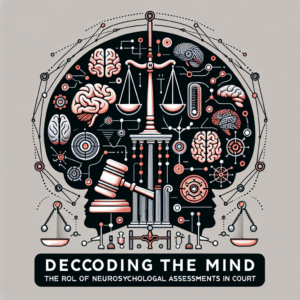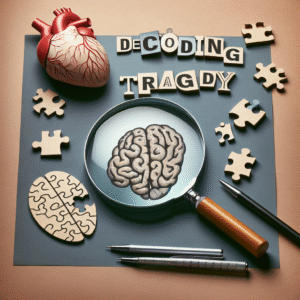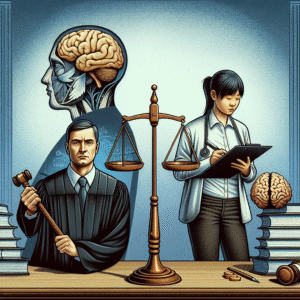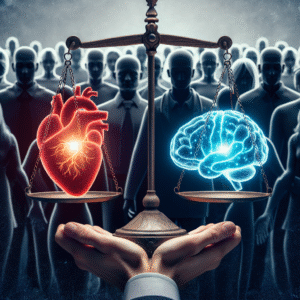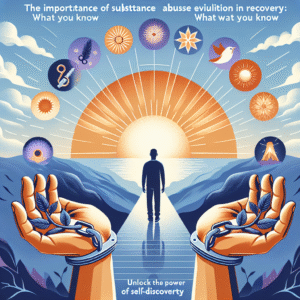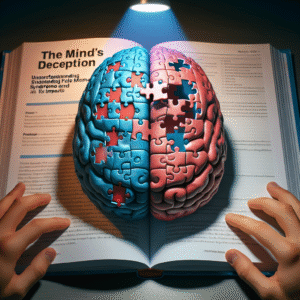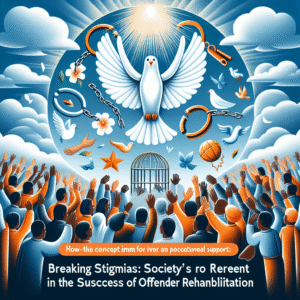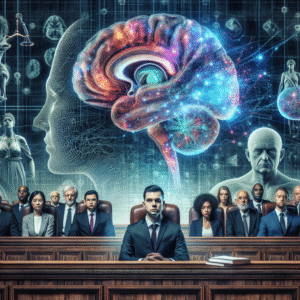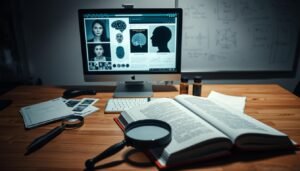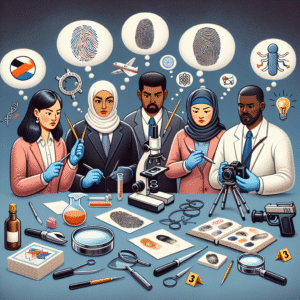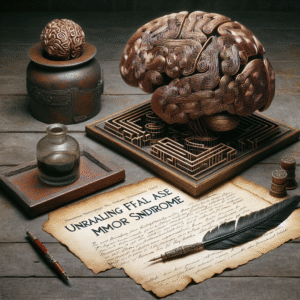Introduction Imagine stepping into a courtroom, the air tense with anticipation. At the center of this legal arena, intricate human minds collide—each one holding secrets, traumas, and histories that could shift the scales of justice. As our understanding of the brain advances, so does our ability to uncover the nuances of human behavior. This is where neuropsychological assessments come...
Forensic Psychology
forensic psychology
Introduction Every year, millions of people around the globe are touched by the tragedy of suicide. It stands as a stark reminder of the fragility of human life and the complexities of mental health. As society evolves, so too does our understanding of the multifaceted reasons behind these devastating decisions. One essential tool in this exploration is the psychological...
Introduction Imagine sitting in a courtroom, surrounded by stark realities. You hear stories of pain, resilience, and the quest for justice. Among the voices rises a delicate yet powerful narrative—the toll of trauma, often hidden yet profoundly impactful. This brings us to the intersection of trauma and legal proceedings: Trauma on Trial: The Role of PTSD in Personal Injury...
Introduction In a world increasingly aware of mental health issues, the complexities surrounding trauma have become a focal point of discussion among healthcare providers, counselors, and individuals alike. Navigating the Complexities of Trauma: Effective Assessment Strategies is not just an academic exercise; it reflects the urgent need to understand and treat trauma effectively. Our lives are often enriched or...
Introduction In an era marked by rapid societal change and evolving moral landscapes, few topics provoke as intense a debate as capital punishment. "Capital Punishment Under the Microscope: Analyzing Efficacy and Ethics" is crucial in understanding whether this ultimate form of justice serves a meaningful purpose in modern society. With an estimated 2,500 inmates currently on death row in...
Introduction In the landscape of criminal justice, few concepts inspire as much heated debate as sentencing. The traditional view often focuses on punishment as retribution for wrongdoing. However, an emerging paradigm challenges this notion: Beyond Punishment: Exploring the Role of Sentencing Mitigation in Criminal Justice. This approach suggests that understanding the underlying causes of criminal behavior and incorporating sentencing...
Introduction In an era where cyber threats loom larger than ever, understanding The Role of Threat Assessment in Cybersecurity: Staying One Step Ahead is essential for any organization. Just as a seasoned chess player anticipates the opponent’s moves, cybersecurity professionals must proactively identify and assess potential threats. This article explores the significance of threat assessment and its immense value...
Introduction In a world marked by increasing diversity, the field of forensics plays a pivotal role in ensuring justice for all. Whether it’s analyzing DNA, interpreting psychological profiles, or gathering eyewitness testimony, the nuances of culture significantly impact every facet of forensic work. Cultural competence in forensics isn’t just a buzzword; it’s an essential component in enhancing justice through...
Introduction In a world where the intersection of law and psychology plays a pivotal role in determining the outcomes of critical legal cases, the intricate dance between justice and ethics is more relevant than ever. Justice vs. Ethics: The Complex Role of Forensic Psychologists encompasses not just the duties of professionals in this field, but the profound implications their...
Introduction Imagine a world where justice doesn’t just punish but heals. In the realm of criminal justice, mental health courts are becoming a beacon of hope for individuals grappling with mental illness, providing pathways not only for legal redress but also for genuine recovery. Healing Through Justice: The Impact of Mental Health Courts on Individuals and Communities is a...
Introduction In a world where substance abuse can devastate lives and tear apart families, understanding the role of evaluation in the recovery process is more crucial than ever. The importance of substance abuse evaluation in recovery: what you need to know can be a game-changer for individuals seeking help. It serves as the foundation upon which effective treatment plans...
Introduction Imagine recalling a cherished childhood memory—playing with friends at a family picnic, laughter ringing in the air, the scent of barbecue wafting around. Now, picture being told that this memory never occurred. Welcome to the intriguing yet unsettling concept of False Memory Syndrome. As our brains intricately weave narratives, they sometimes create convincing fabrications, blurring the line between...
Introduction In a world fraught with conflict and uncertainty, the art of negotiation takes center stage, especially during extreme scenarios where stakes are high. One such critical area is hostage negotiation. Imagine a life-threatening crisis looming over negotiations with dramatic twists and turns. What sounds like a high-stakes thriller is instead a reality for skilled negotiators whose primary goal...
Introduction In an era where extremism seems to take root more deeply with each passing day, understanding and assessing radicalization is critical. "From Awareness to Action: Effective Strategies for Radicalization Assessment" is not just a tagline but a call to action for communities, policymakers, and analysts alike. The consequences of failing to address radicalization can be catastrophic, affecting the...
Introduction In a world perpetually shaken by violence and turmoil, understanding the underpinning mechanisms of terrorism has never been more pivotal. The results of terror attacks reverberate far beyond immediate casualties, stretching deep into the psyche of entire communities and nations. The emotions of "fear" and "fury" are at the core of these tactics, engendering a cycle that both...
Introduction In the digital age, scamming has evolved from street cons to sophisticated cyber schemes that exploit not just technology, but human psychology. As we find ourselves entwined in a web of digital interactions, the importance of understanding these tactics cannot be overstated. "Digital Deception: Understanding the Psychological Tactics Behind Cyber Scams" sheds light on the cunning methods employed...
Introduction When it comes to solving crimes, intuition and instinct are essential, but in today’s data-driven world, science has emerged as a powerful ally. Enter the methodology known as Geographic Profiling, a fascinating blend of geography, psychology, and data analytics that can make or break a case. The phrase "Location, Location, Location" has defined real estate for decades, but...
Introduction Imagine walking through a crowded market and suddenly becoming acutely aware of someone’s nervous fidgeting, the way they avoid eye contact, or their abrupt changes in tone. What if you could decode these subtle signals to better understand their emotions and intentions? Welcome to the world of behavioral evidence analysis, where the intricacies of human behavior are laid...
Introduction Workplace violence is a pressing issue that can have devastating impacts on both employees and organizations. From verbal abuse to physical attacks, the spectrum of violence in the workplace is alarmingly broad. According to the Occupational Safety and Health Administration (OSHA), businesses must act to safeguard their employees against potential threats, highlighting the urgency of Preventing Workplace Violence:...
Introduction In the ever-evolving landscape of workplace safety and productivity, the concept of fitness for duty has never been more crucial. Employers are tasked not only with ensuring that their teams can perform their roles effectively but also with safeguarding the health and well-being of their employees. Evaluating Fitness for Duty: A Comprehensive Guide for Employers serves as an...
Introduction Imagine being detained by law enforcement, questioning your rights and understanding of the situation. The moment can be life-altering, with profound implications for your future. One of the cornerstones of ensuring fair treatment in the justice system is the concept of Miranda competence. The term may sound legalistic and intimidating, but it fundamentally serves to protect individual rights...
Introduction Imagine a dimly lit room where the weight of guilt hangs in the air, and the ticking clock intensifies the tension. In this high-stakes environment, the art of interrogation unfolds—an intricate dance of psychology, strategy, and ethics. The Art of Interrogation: How Techniques Shape Justice is not just a matter of extracting confessions; it’s about unearthing the truth...
Introduction In an era where wrongful convictions and the reliability of eyewitness testimony are under intense scrutiny, Understanding Lineup Procedures: A Guide for Legal Professionals emerges as not just relevant, but crucial. Lineups can be pivotal in identifying suspects, yet they also bear the risk of misidentification. This guide aims to demystify the processes involved in lineups, providing legal...
Introduction: The Fragility of Memory Picture this: You’re in a crowded room, surrounded by friends reminiscing about a shared vacation. Suddenly, someone mentions a funny incident that you clearly remember differently. Confusion ensues, and soon you’re questioning your own recollections. This scenario highlights an unsettling truth about human memory—it’s not as reliable as we might think. Welcome to The...
The Importance of Understanding Child Witnesses In the courtroom, the testimonies given by witnesses can shape the outcome of a trial. Among these witnesses, children introduce a unique set of dynamics that warrant careful consideration. In the courtroom: understanding the strength and limitations of child witnesses is essential for legal practitioners, jurors, and society at large. As vulnerable members...
Introduction: The Weight of Understanding Imagine waking up one day, only to find your world has changed forever. Brain injury can flip life upside down in an instant: relationships can fray, careers can crumble, and dreams can shatter with a single incident. For countless victims, navigating the aftermath is an emotional and financial labyrinth, dominated by uncertainties. That’s why...
Introduction Imagine a society where second chances are not just a concept but a reality. Where those who have stumbled find a supportive hand, not judgmental stares. The journey toward rehabilitation for offenders is riddled with challenges, most notably the societal stigma that often accompanies their past actions. Breaking stigmas: society’s role in the success of offender rehabilitation is...
Introduction Imagine walking into a courtroom, not armed with witness testimonies or physical evidence, but with a scan of your brain that reveals deeper truths about your mental state and intentions. This is more than a futuristic concept; it’s the compelling reality of forensic neuroimaging, an emerging field that is poised to revolutionize legal trials. As science and technology...
Introduction Picture this: an individual, once on the wrong side of the law, is released from prison, determined to turn their life around. What’s their greatest resource in this daunting journey? Surprisingly, it’s not just access to job training or housing — it’s family support. The importance of family support in the rehabilitation of offenders cannot be overstated. Research...
Introduction Imagine a courtroom where the most compelling evidence isn’t just a confession or a surveillance video, but the very signals emitted by a person’s brain. The intersection of neuroscience and law is no longer the realm of science fiction; it’s a burgeoning field of study impacting judicial decisions, jury perceptions, and the understanding of criminal intent. This article,...
Introduction In an age where innovation permeates every facet of our lives, the realm of rehabilitation is experiencing a groundbreaking transformation. Technology in Rehabilitation: How Virtual Programs Are Changing Lives serves not only as a revolutionary trend but also as a beacon of hope for countless individuals seeking recovery and restoration. As we delve deeper, we’ll explore how virtual...
Introduction Imagine a world where the voices of the deceased still resonate—we can grasp their struggles, triumphs, and traumas even after they have left this earthly realm. This isn’t the realm of fantasy but a method steeped in psychological exploration: psychological autopsies. Beyond the Grave: How Psychological Autopsies Illuminate Untold Stories serves as both a compelling narrative and a...
Introduction Imagine walking into a courtroom, your heart racing, palms sweaty, as your mind races back to the trauma you endured. For many, this scenario isn’t just fictional; it’s a harrowing reality shaped by the invisible scars of Post-Traumatic Stress Disorder (PTSD). The Silent Struggle: How PTSD Affects Legal Outcomes delves into this complex interplay, exposing the nuances between...
Title: The Ultimate Guide to Customization: Feel Free to Mix and Match Elements or Modify Them to Better Fit Your Specific Focus! Introduction In a world bursting with choices, the power to customize and personalize something truly resonates with people. Whether it’s in design, branding, or personal development, the ability to "feel free to mix and match elements or...
Introduction Imagine a world where individuals who have stumbled down the wrong path can find their footing again. Youth offender rehabilitation is not just a matter of societal obligation; it is an investment in our collective future. When we prioritize effective rehabilitation strategies, we not only address the root causes of juvenile crime, but we also foster safer communities...
Introduction In today’s fast-paced world, trauma is more prevalent than ever—spanning from fleeting experiences to profound life-altering events. Yet, despite its widespread impact, trauma remains one of the most misunderstood and under-assessed issues in mental health. This is where our journey begins: "Beyond the Surface: A Comprehensive Guide to Trauma Assessment." Understanding trauma isn’t merely about identifying symptoms; it’s...
Explore the real effectiveness of Offender Profiling compared to modern Investigative Psychology methods in solving crimes. Learn which approach delivers better results in criminal cases
Discover how Forensic Risk Assessment tools help predict criminal behavior and understand their limitations in evaluating potential threats in clinical settings
Explore the critical elements of digital evidence forensics, including chain of custody, metadata, and common mistakes to avoid.
Uncover the psychological underpinnings of the courtroom, from juror biases to the role of expert testimony in legal proceedings.
Victims of deepfake sextortion and non-consensual images have options. Our comprehensive tutorial outlines practical steps to protect your privacy and rights.
Discover how forensic genetic genealogy is revolutionizing cold case investigations. Dive into the complex ethical considerations surrounding this groundbreaking approach.
Introduction In today’s fast-paced world, creativity is more essential than ever. Whether you’re running a business, embarking on a personal project, or simply trying to solve everyday problems, the ability to think outside the box can set you apart. With so many ideas circulating, the key to innovation often lies in flexibility—specifically, the ability to feel free to adapt...
Introduction In an era defined by advances in technology, shifting societal values, and ongoing debates about human rights, the topic of capital punishment remains both relevant and contentious. The practice of executing individuals for serious crimes evokes powerful emotions, ethical dilemmas, and multifaceted discussions surrounding justice, deterrence, and moral responsibility. This article, Weighing Justice: An In-Depth Evaluation of Capital...
Introduction In today’s fast-paced world, the ability to adapt and customize strategies to meet your specific needs is more crucial than ever. Whether you’re planning a project, curating a marketing campaign, or even crafting a personal life strategy, the resources available can often feel overwhelming. This is where the mantra, "Feel free to modify or combine these suggestions to...
Introduction In the complex world of criminal justice, one element stands out as an essential tool for reform and change: compassion. The Power of Compassion: How Sentencing Mitigation Influences Justice is not just a compelling phrase; it is a transformative approach that emphasizes understanding and mercy amidst the machinery of law. As societies grapple with the implications of punitive...
Introduction In the ever-evolving fields of criminal psychology and law enforcement, one of the most crucial tools at a professional’s disposal is forensic assessment. Understanding criminal behavior is vital for preventing crime and ensuring justice. But how do we truly gauge the complexities of the human mind within the context of crime? This is where dissecting forensic assessments becomes...
Introduction In an era of rapid technological advancement and evolving global threats, understanding threat assessments can be the difference between a secure organization and a vulnerable one. From cyberattacks to workplace violence, the threats that organizations face today are diversifying and becoming more sophisticated. In this comprehensive guide, "Understanding Threat Assessment: A Comprehensive Guide for Organizations," we will explore...
Introduction The human mind can be as perplexing as it is fascinating. When dissected in the context of crime, it invites a myriad of questions: What motivates a person to commit an act of violence? Can we predict their next move? And, most critically, is behavior truly indicative of intent? The topic of criminal profiling serves as a focal...
Introduction In a world that is increasingly interconnected yet culturally diverse, the field of forensic science faces unique challenges, particularly when it comes to evidence collection. The phrase “Forensic Challenges: Understanding Cultural Differences in Evidence Collection” encapsulates the complexities involved in navigating cultural nuances during investigations. As societal norms and values can vary widely across cultures, the methodologies employed...
Introduction In an age where the conversation around gender inequality is at the forefront of social justice issues, it becomes paramount to examine how systems of support, especially in rehabilitation, cater distinctively to the needs of female offenders. The need for gender-specific approaches to rehabilitation is pressing and significant, as research continues to reveal that women experience incarceration and...
Introduction Forensic psychology sits at the unique intersection of law and mental health, blending the principles of psychology with the complexities of the legal system. As professionals in this field engage with high-stakes evaluations, criminal cases, and the often murky waters of human behavior, they frequently encounter ethical dilemmas. Navigating the Gray Areas: Ethical Dilemmas in Forensic Psychology is...
Introduction In recent years, community programs focused on treating sex offenders have garnered significant attention, yet they often remain misunderstood. The perception surrounding sex offenders can be overwhelmingly negative, leading to stigma that complicates rehabilitation efforts. However, comprehensive community programs that make a difference in sex offender treatment demonstrate the power of innovative strategies aimed at reducing recidivism and...
Introduction Imagine a court system designed not to punish, but to heal. This profound shift is currently unfolding across the United States and other parts of the world, where mental health courts are emerging as an essential component of the justice system. In this in-depth exploration of "Transforming Justice: How Mental Health Courts are Reshaping Legal Outcomes," we will...
Introduction Imagine waking up one day, stepping out of your home, and being thrust into a traumatic incident that alters your life forever. The aftermath of crime doesn’t just end with the last echo of a siren; it lingers, embedding itself in the psyche of victims and those around them. Victimology and Mental Health: Understanding the Aftermath of Crime...
Introduction Every year, millions of individuals confront the harsh realities of substance abuse, a challenge that extends beyond the individuals involved, impacting families, communities, and society at large. Understanding substance abuse evaluation becomes not just an academic exercise but a crucial step on the path to recovery and healing. This article serves as a comprehensive guide to unravel the...
Introduction In an age where the lines between truth and falsehood blur more than ever, mastering the art of deception detection isn’t just useful; it’s essential. From casual conversations to negotiations, detecting deception can save you time, money, and emotional turmoil. With the rise of social media and digital communication, the ability to read between the lines is increasingly...
Introduction Have you ever been convinced of a memory that turned out to be completely false? Perhaps you recall a childhood event that everyone insists never happened, or you might find yourself misremembering someone’s words or actions. These phenomena aren’t just quirks of memory; they’re deeply rooted in the science of psychology. In this article, we dive into Unraveling...
Introduction In an era characterized by rapid change and an overwhelming influx of information, customizing content has become vital for success. Whether you’re a marketer seeking to engage a diverse audience or an educator aiming to captivate students, the principle remains the same: feel free to modify them to better fit your target audience or specific focus! Untapped potential...
Introduction In a world defined by crises and conflict, the daunting task of hostage negotiation stands out as one of the most complex and delicate forms of communication. The stakes are incredibly high; lives hang in the balance, and every word carries the potential of life or death. Understanding the dynamics of hostage negotiation is not merely an exercise...
